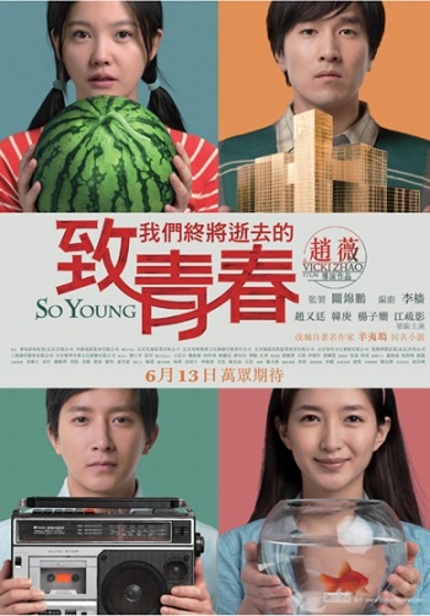Review: SO YOUNG Is (Mostly) An Endearing Nostalgia Trip From Zhao Wei

For a solid ninety minutes, Zhao Wei's first feature film as a director, So Young, is an endearingly nostalgic tale of romance and rite-of-passage played out against the backdrop of university life in the 1990s. Based on Xin Yiwu's popular novel To Our Youth That Is Fading Away (which the film uses as its Chinese title), Zhao uses Li Qiang's script as a jumping off point to reminisce about her own adolescence, turning a work of popular fiction into a personal exploration of her formative years.
Author Xin Yiwu originally approached Zhao to play the novel's central protagonist, Zheng Wei, but instead the actress chose to direct the film, with noted auteur Stanley Kwan on board as producer. Zhao cast unknown actress Yang Zishan as the film's lead instead, and her decision to surround her with similarly inexperienced, yet able performers adds to the film's overall freshness and vitality.
The notable exception to this brave casting coup was in the roles of the film's two male leads. The filmmakers clearly recognise their target demographic to be largely young and female, and so we have Taiwanese heartthrob Mark Chao as Chen Xiaozheng, the reclusive architectural student who becomes the object of Zheng's affections, while mainland popstar Han Geng plays Lin Jing, Zheng's childhood sweetheart.
So Young follows Zheng Wei as she moves from her small-town roots into the intimate confines of a university boarding house. She must contend with prettier, richer, smarter and more ambitious girls, as well as fend off amorous advances from a number of different boys. Eventually she makes loyal friends of her roommates, the beautiful Ruan Guan (Jiang Shuying), determined Weijun (Zhang Yao) and tomboyish Xiaobei (Yase Liu), but is soon swept off her feet by the quiet, mysterious Chen Xiaozheng, whose initial indifference to her advances only spurs Zheng on to try harder.
Events play out in a charming, if rather familiar manner, as the youngsters suffer through a series of petty failures and successes, before eventually graduating as more rounded human beings than when they enrolled. But as was the case with Peter Chan's recent American Dreams in China, once our protagonists leave college and head out into the world, the film quickly begins to spiral out of control.
The final third of So Young jumps forward seven years, to compare how each has fared in the real world, learned from their mistakes and moved forward in their personal lives. Where the film's first two acts could be forgiven their unsubtle, perhaps even heavy-handed approach, due to the innocence and inexperience of the characters, this extended coda attempts to show them older, wiser and grounded by world-weary pragmatism. As a result, the heavy-handedness of the script becomes more apparent, the characters' motivations more exposed to scrutiny and their resulting successes and failures less impactful as a result.
So Young embraces a current trend in contemporary Chinese Cinema to move away from clumsy historical epics and focus on more personal stories in the country's more recent past. However, the film also exposes many of the problems it encounters when attempting to tell stories set in the present day. Too quickly themes of financial and economic growth rise to the surface, together with overt moralising over how characters should and shouldn't behave. The film begins to talk down to its audience, to hold its protagonists accountable for their youthful mistakes, effectively bursting the dreamy bubble of nostalgia that the film had worked so hard to recreate.
The experience of Mark Chao and Han Geng shines through in their more muted performances, while the newcomers go all-out to attract our attention. Fortunately, Zhao's direction keeps the young cast on track and Yang Zishan, Zhang Yao and Bao Bei'er are particular stand-outs, although there are no obvious weak links. Elsewhere, the film looks gorgeous, whether gazing skywards through the dappled shade of the university lawns, or winding through the cramped corridors of the dilapidated students' quarters. Zhao also earns kudos for shelling out for British indie band Suede's 1993 title track, although judging from the amount of free advertising the band's comeback tour gets in the film's final segment, it is difficult to imagine it was too expensive.
China is clearly paying attention to movie-going trends in neighbouring Taiwan, where reliving bygone school days on film has proved exceptionally lucrative in recent years. So Young opened in the mainland in late April, going head-to-head with Marvel's gargantuan Iron Man 3, and beat the superhero blockbuster to the all-important $100 million mark. Less overtly Chinese than other recent domestic box office hits, So Young could attract some interest in overseas markets, if only to see how university life in other parts of the world differs from at home.
Regardless, So Young has recouped its RMB 30 million budget more than 20 times over, ensuring that if she were so inclined, Zhao Wei should have no problem securing financing for a sophomore directorial feature, and we will likely see a lot more of this young cast in the years to come.
So Young
Director(s)
- Wei Zhao
Writer(s)
- Qiang Li (screenplay)
- Yiwu Xin (novel)
Cast
- Mark Chao
- Geng Han
- Zishan Yang
- Shuying Jiang

Do you feel this content is inappropriate or infringes upon your rights? Click here to report it, or see our DMCA policy.






